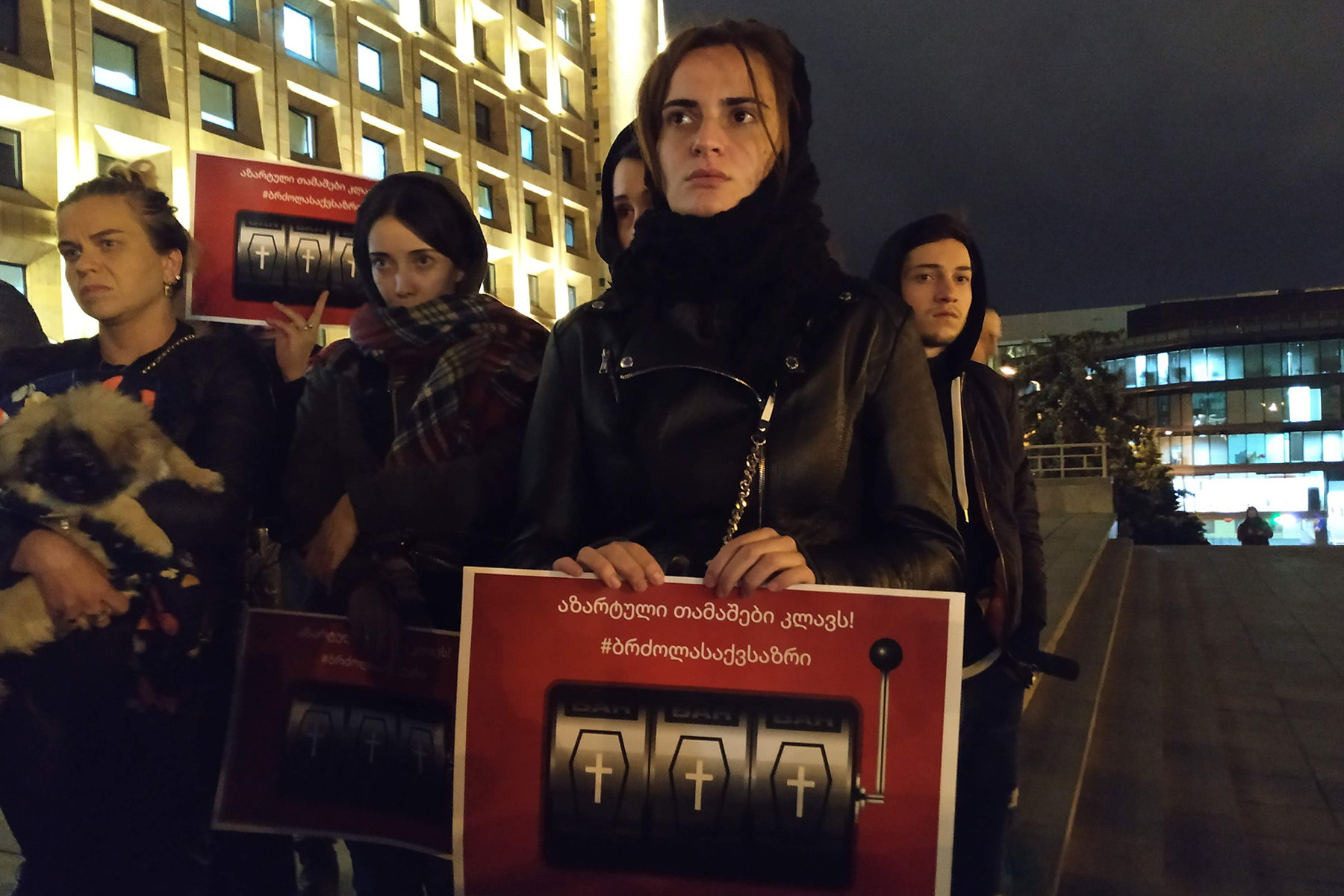Anti Gambling
This Anti-Gambling Public Service Announcement was created for the 'Big Money' contest put on by The Pictou County Health Authority. It aired on Global Telev.
Last updated: 08/5/2019
Author: Addictions.com Medical Review
Reading Time: 3minutes
Our Games and Betting Anti Gambling Poster Offers are provided for entertainment only. Any stakes you place on a Game or Bet (including pre-purchased bingo tickets) are non-refundable Anti Gambling Poster as the product is virtual and is instantly consumed. If you play a Game or Bet with Real Money, funds will be drawn from your Account instantly and cannot be returned. The Big Step is a Gambling with Lives charity project formed from lived experience of gambling harm. They advocate for a public health approach to preventing gambling harm through campaigning, education and awareness work in football.
Even without the physical triggers so commonly associated with drug addiction, gambling disorders can wreak just as much havoc in a person’s life. While drug addiction works as a substance-based disorder, gambling addictions have more to do with a lack of impulse control.
Gambling addiction often affects people who also struggle with alcohol abuse.
Ultimately, it’s the loss of control that defines addictive behavior regardless of the substance or activity involved. Gambling addiction statistics present this “loss of control” factor in a stark and alarming light.
Gambling addiction statistics show how problem gambling can up-end a person’s life in more ways than one. Not unlike other types of addiction, people most susceptible to gambling also suffer from other disorders of which they may or may not be aware.
Probably the most glaring revelation to be had from gambling addiction statistics lies in the consequences that result when gambling disorders go untreated.
1. Gambling Trends
As with all types of data, certain trends or patterns of behavior start to surface within a given population. Gambling addiction statistics are no different. Some of the more prevalent gambling trends show:
- The likelihood of developing a gambling addiction increases 23-fold for people affected by alcohol use disorders
- Over 80 percent of American adults gamble on a yearly basis
- Three to five gamblers out of every hundred struggles with a gambling problem
- As many as 750,000 young people, ages 14 to 21 have a gambling addiction
2. Gambling & Criminal Activity
As far as gambling and criminal activity goes, gambling addiction statistics reveal a direct correlation between the severity of a gambling addiction and the likelihood of committing crimes. Rates of gambling addiction for criminal offenders far exceed rates found among non-offenders. On average, an estimated 50 percent of those affected by gambling problems commit crimes in order to support their addiction.
3. College Gambling
Gambling addiction statistics show people between the ages 20 and 30 have the highest rates of problem gambling.

- 75 percent of college students report having gambled during the past year
- The risk of developing a gambling addiction more than doubles for young adults in college settings
- An estimated six percent of American college students struggle with gambling problems
4. Gambling & PTSD Trends

People affected by post-traumatic stress disorder or PTSD live with high levels of stress and anxiety on a daily basis. Gambling addiction statistics show high rates of gambling addiction among PTSD sufferers.
- PTSD symptoms affect anywhere from 12.5 to 29 percent of problem gamblers
- 34 percent of those who seek treatment for gambling addiction exhibit symptoms of PTSD
5. Gambling & Mental Illness
As addictions, in general, alter brain chemical functions in destructive ways, people struggling with gambling addiction have a higher likelihood of developing mental disorders. Gambling addiction statistics show a high incidence of certain types of mental illness, some of which include:
- Depression disorders
- Anxiety disorders
- Substance abuse disorders
- Anti-social personality disorder
As with any other type of addiction, a gambling addiction can only get worse when left untreated.
Online gambling is already illegal in the United States. Proprietors of gaming sites are all incorporated overseas. Yet Internet wagering is still a $12 billion industry.

History has shown us that prohibiting private, consensual behavior has never made that behavior go away. Because consensual crimes take no victims, vice laws are difficult to enforce. Police have to use informers and undercover work and sometimes need to break the very laws they’re trying to enforce.
Consequently, America’s various attempts at prohibiting sinful behavior have bred corruption, organized crime, black markets and significant erosion of our civil liberties. The story’s no different with gambling.
Here are the three chief reasons why Congress’ latest vice crusade is misguided:

Feds not our baby‐sitter
What we do with our own money on our own time ought to be our own business. The idea that government is somehow obligated, or even authorized, to protect us from our own vices and “bad” habits simply isn’t compatible with a free society.
If five poker enthusiasts want to voluntarily play online, and if a private company wants to provide the technology for that to happen in exchange for a fee, why do members of Congress feel obligated to prevent that from happening?
Like many bad laws, gambling prohibition is often justified in defense of “the children.” But for a minor to wager online, he’d need a credit card or access to a bank account. It isn’t as if children are easy prey for gambling sites.
It’s naked hypocrisy
Last month, police in Fairfax, Va., conducted a SWAT raid on Sal Culosi Jr., an optometrist suspected of running a sports gambling pool with some friends. As the SWAT team surrounded him, one officer’s gun discharged, struck Culosi in the chest and killed him. In the fiscal year before the raid that killed Culosi, Virginia spent about $20 million marketing and promoting its state lottery.
The scene is similar in other states. Charity and barroom poker games, for example, are being shut down by police departments across the country. Meanwhile, state lotteries are cashing in on the poker craze with Texas Hold’em-style scratch‐off games.
Congress isn’t immune from the double standard. The new anti‐gambling bill sponsored by Virginia Rep. Bob Goodlatte contains a gaping loophole that lets state lotteries continue to sell their tickets online. And just as Goodlatte, Arizona Sen. John Kyl and others in Congress have been earnestly lecturing us on why we need our politicians to protect us from our own peccadilloes, 28 states, including Arizona, were cashing in on the hyped $365 million Powerball jackpot.
Which makes all these efforts to ban private gambling sound more like a protection racket than good government.
It won’t work
As noted, despite prohibitions against Internet gambling, it’s still a billion‐dollar industry. Prohibitionists have argued that a law preventing credit‐card companies from allowing their services to be used in conjunction with gaming sites will prove to be the death knell for online wagering.
Hardly. In fact, several state attorneys general already have gone after the credit companies and online payment services like PayPal, threatening them with Patriot Act charges for doing business with gaming sites. Consequently, third‐party vendors such as Neteller, also located offshore, have sprung up to facilitate transactions between gamers and gaming sites.
Congress can keep passing laws. But so long as there is demand, innovators will continue to use technology to find ways around them.
On CNBC three weeks ago, Goodlatte pointed out that because gambling companies themselves are offshore, they aren’t subject to U.S. laws and regulations. But that’s an argument against his own bill. Goodlatte’s bill won’t stop Internet gaming. Instead, it will not only keep gaming companies offshore, it will facilitate the rise of offshore financing services, too.
Anti Gambling Poster
That means U.S. consumers will be more susceptible to fraud and will have no legal recourse when a shady offshore outfit bilks them out of their money.
Not to mention that offshore, black‐market outfits present prime funding opportunities for organized crime and international terrorism.
Anti Gambling Law Philippines
A more sensible policy would be to legalize online gambling and let credible gaming companies do business within the reach of U.S. law. The good ones are already begging to be regulated.
Anti Gambling Law
They understand that legitimately setting up shop in the United States will give them an advantage over their competitors. Consumers will be more likely to place bets on sites governed by U.S. laws and subject to U.S. courts.
Anti Gambling Quotes
Unfortunately, Congress seems more interested in pushing a moral agenda than taking a realistic approach to a habit that is as old as human nature.